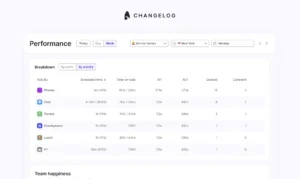
The transformation of customer service jobs in 2024

With the rapid evolution of AI and LLMs in the last two years, customer service is changing more rapidly than ever.
This provides a promising opportunity for customer service teams to truly become profit centres, moving from a focus on handling reactive inflow to diversifying the tasks agents work on to solve the root cause of customer problems and improve the level of personalised service a customer can receive from a brand or service.
It’s also an opportunity across all ways of working for customer service teams — whether it’s their technology stack, how they work with business process outsourcers (BPOs), the profiles of agents they hire, and ultimately the types of work agents do. It’s finally time to rethink customer service operations to make it work for the company, its customers, and its employees.
To help gain a snapshot into the current state of customer service in 2024, we conducted an in-depth survey to gather insights from the customer service community regarding their strategies, goals, and challenges. At our recent event, we also interviewed Dan Bunton, Head of Customer Support at Cleo AI, and Shamas Aziz, Head of Community & Partnerships at SentiSum to hear their expertise and inside-knowledge in customer service.
The third wave of customer support
As it stands, we’re in the third wave of customer support.
The first wave showed an introduction of new digital channels, and a shift from phone support and letters to live chat and emails.
The second wave was a COVID-19 induction of remote working and growth of digital services, which led to large-scale, often international, remote teams.
The third wave is the hybridisation of AI and humans in customer support, allowing for the agent’s role to transition from purely reactive support to include proactive support and potential profit-driving activities.
The third wave is also characterised by an increase in personalisation and customer loyalty. With the aid of AI, companies can use customer data to deliver highly personalised experiences like tailored recommendations and customised support interactions. Despite these interactions involving the use of AI, their goal is to make customer support feel more human, and to make customers feel valued and understood.
Let’s have a look at some of our key findings.
Download the full report here
AI in customer service
A study by Gartner found that over 60% of customers were hesitant about AI in customer support, primarily due to concerns about difficulty reaching a human agent. Nearly half of those surveyed also worried that AI might displace jobs.
However, our survey reveals a different narrative: AI isn’t eliminating the need for human agents but enhancing their roles. Rather than replacing human agents, AI is augmenting their work, allowing them to focus on providing higher quality, personalised interactions. Regarding staffing levels, Shamas says:
“The sweet spot is 30%, because really, you don’t want to throw your customers into that death loop of sending an email and getting a response that then just goes running in circles. I think that practical application is really good at not reducing contact, but it helps your team to focus elsewhere.”
This corroborates insights from our own survey, which found that most CS leaders expect AI to resolve between 11% and 30% of total inbound queries. By automating routine and high-volume queries, AI frees up human agents to tackle more complex and nuanced issues that require a personal touch.
Less than 25% of respondents expected AI to reduce staffing levels. In contrast, 75% believe that AI tools enable agents to concentrate on more intricate tasks, and over 60% noted that faster response times were a significant driver for adopting AI. Additionally, respondents highlighted AI’s value in supporting out-of-hours work (42%), scaling business operations (29%), and efficiently handling multiple languages (25%).
Investment in AI is already widespread among customer support leaders, with 70% having integrated AI into their operations. The most popular AI investments include AI agents and chatbots (77%), AI copilots (34%), and customer intelligence capabilities (29%). Among those who haven’t yet invested in AI, 55% plan to do so within the next month, prioritising AI agents and chatbots.
Basic AI auto-tagging tools drastically increase the quality of data and reporting, allowing you to make the best use of valuable interaction records that you already have. On this topic, Shamas also cited, “Using AI to do tagging is a much better way. AI doesn’t get tired and it’s more consistent. LLMs can actually pick up the intent that a human sometimes can’t do. So there’s research out there that in the contact centre, the average accuracy for a tag on a contact added by a human is about 50%. With AI, you’re looking at 80-90%”. Additionally, AI QA and intent-based CSAT allow teams to analyse and optimise every interaction with a customer.
AI is not leading to job losses; instead, it is evolving the role of customer service agents. By taking over low-value, high-volume queries, AI allows agents to engage in more complex and human-centric work. Tools like AI copilots and customer intelligence are making agents more efficient, enabling them to provide the higher quality, personalised support that customers expect.
Customer service priorities in 2024
Over two thirds of customer support leaders claimed their top priority this year was improving the quality of their customer support, and half of those surveyed said that the biggest change in their customer support team was an increased focus on customer loyalty and personalisation. This priority is to address the fact that customers have higher-than-ever customer expectations when it comes to the relevance, empathy, and personalisation of the communications they receive.
Alongside support quality, the next highest priority was deploying AI in support teams, with 45% saying this was a goal over the next 12 months. Other common priorities were cost reduction (39% of respondents) and contact volume reduction (35%).
Customer support leaders see significant changes in how agents’ work will evolve over the next 12 months. More than half (55%) of respondents highlighted an increased focus on loyalty and personalisation, while 19% are directing efforts towards profit-driving initiatives. Additionally, 12% foresee agents engaging in more back-office or administrative work.
As an established AI company, Dan and the Cleo team have already started using agent capacity to do more proactive outreach for customers — without waiting for them to get in contact when it’s too late, “One area that we’re really noticing is that so many people can’t be bothered to reach out to customer support to solve their issue, right? Like, their intent needs to be really high to use your product, to go through the hoops of reaching out to customer support”. After identifying patterns in their data related to inflow, the team then reached out proactively to any customers experiencing it, saying, “Hey, did you get this error? I’ve gone into the back end and fixed that for you’. And so in that way, we’re actually moving into proactive customer support”.
BPOs in 2024
Business Process Outsourcing (BPO) continues to play a sizable role in customer support, with 36.1% of survey respondents currently using BPO services. However, there’s a noticeable shift, with 41% expecting to reduce their reliance on BPOs as AI and other technologies take on more routine tasks.
Despite this, there is also an increased demand for BPOs to handle proactive and more complex work (20.5%), alongside the broader strategy of utilising in-house agents on loyalty and profit-driving activities.
The introduction of AI is also opening up additional opportunities for BPO teams. At Cleo, the team outsources a portion of their AI review work to a specialist company, “In AI, there’s a phrase called ‘human in the loop’. Basically, humans are going through and looking at AI conversations and reviewing their quality. There are whole companies set up now to do that for you, and so we’re outsourcing our work to one company. Suddenly we’ve got, I think, 100 people annotating our conversations.”
Beyond just their work, BPOs possess invaluable industry knowledge that can help navigate problems in customer experience. As Shamas said, “If you have a problem in the custom journey you’re unsure of how to solve it, go and speak to your BPO, as they’re the experts.”
Customer service tools in 2024
For many CS teams, the ‘AI readiness’ of their existing tech stack can reduce their ability to adopt functional AI tools, with many needing new tools and services to add AI functionality to their workflows. Often, this barrier can prevent teams from even considering AI as a potential solution.
For those surveyed, having a consolidated tool is more important than ever, with 59.3% citing it as ‘extremely important’. New tools can cause issues in the customer journey and disrupt internal ways of working, so it’s vital that AI systems integrate with the services they’re currently using.
Helpdesk and CRM systems have proven to be the most challenging tools to implement, with 39% of customer support leaders identifying them as difficult to integrate alongside their current systems. Workforce Management (WFM) tools (19%), Telephony/CCaaS (18%), and QA systems (15%) also presented challenges, while HRIS tools were less troublesome (6%).
Despite these difficulties, 17% of respondents plan to implement or change their Helpdesk/CRM systems in the next year, along with similar percentages for QA (19%), WFM (17%), and Telephony/CCaaS (16%) tools. Notably, 50% of those surveyed don’t anticipate making changes to their tech stack in the upcoming year.
Interested in a WFM tool which helps synergise your AI capabilities and customer service teams? Check out a free demo of Surfboard WFM today to see how you can get started.
In conclusion
In short, AI isn’t here to take the jobs of customer support agents. In fact, the opposite seems to be true. Thanks to AI, the scope of an agent’s job is widening to include other aspects of customer interactions which boost profits and drive loyalty, while making the job role more diverse, engaging and interesting.
Used properly, AI tools can be the key to getting the most out of human agents and their support. The hybrid approach of AI and human expertise sets the stage for a more informed, impactful, and customer-centric future in customer support operations.


